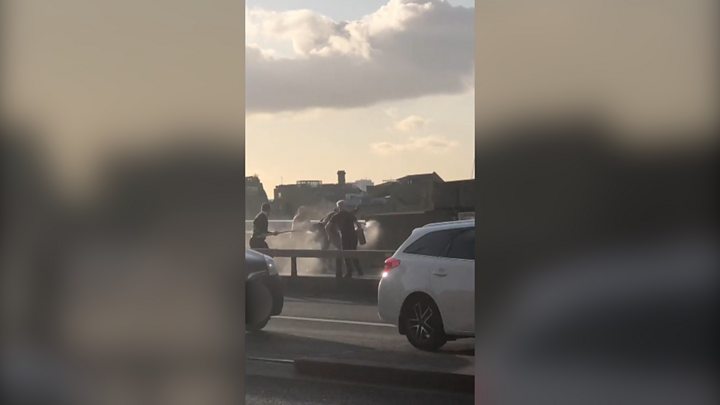
Media playback is unsupported on your device
The woman killed in the London Bridge terror attack on Friday was a former University of Cambridge student.
Cambridge University graduate Jack Merritt and the woman - who has not yet been named - were both fatally stabbed by attacker Usman Khan on Friday.
Three other people were injured in the attack. Two remain in hospital, while one has been discharged.
Professor Stephen J Toope said he was "devastated to learn that among the victims were staff and alumni".
In a statement, the Cambridge University vice-chancellor said the victims were taking part in an event at Fishmongers' Hall on Friday "to mark five years of the university's Learning Together programme" - which focuses on prisoner rehabilitation.
'Abhorrent and senseless'
He added: "What should have been a joyous opportunity to celebrate the achievements of this unique and socially transformative programme, hosted by our Institute of Criminology, was instead disrupted by an unspeakable criminal act.
"I am sad beyond words to report that a course co-ordinator, Jack Merritt, was killed, as was a former student not yet named by the Metropolitan Police.
"Among the three people injured, whose identities have not been publicly released, is a member of university staff.
"Our university condemns this abhorrent and senseless act of terror. Our condolences, our thoughts and our deepest sympathies are with the victims and their families."
Speaking to the BBC, Prof Toope said the fact Mr Merritt was killed by someone he was trying to help "is the greatest tragedy of all".
"I have profound sadness for the family," he added.
"This is an attack on our community and it was intended, in such, to produce a form of terror and sadness - and it has clearly done that.
"It has made many people very sad."
More tributes have been paid to Mr Merritt, by Ken and Dawn Marr, who used to babysit him as a child in Cottenham, Cambridgeshire.
Mrs Marr remembered Mr Merritt as "a bright boy who loved to read" and described his death as "just awful".
Earlier in the day, hundreds attended a service at Southwark Cathedral for the victims of Friday's attack on London Bridge.
The Dean of Southwark Cathedral, the Very Revd Andrew Nunn, said many people were struggling with what happened.
On Friday, the cathedral was put into lockdown as people ran away from London Bridge - where Khan was wrestled to the ground by members of the public and later shot dead by police.
As crowds ran towards the cathedral, Mr Nunn said he "wondered what on earth was going on", adding that it brought back memories of the nearby attack in Borough Market two years ago, which left eight dead and 48 injured.
He described "that sense of déjà vu, and then realising that déjà vu passes very quickly and this, in fact, was reality again".
Speaking at the service, Mr Nunn said "memories have been stirred and wounds have been re-opened".
He added: "What seemed to have been put to the back of people's minds has now been brought to the fore.
"We have to stand with them. We have to help bear their pain but also speak to that pain with words of hope."
'Selfless bravery'
Mr Nunn praised the bravery of the people who confronted Khan as he carried out his attack.
"The actions of evil people can have a terrible impact on our lives, but these people are few in number compared to the good people we see all around us
"Every event of this nature produces stories of such selfless acts of bravery."
London Bridge remains cordoned off while forensic officers continue to search the scene where Khan carried out his attack and was killed.
Khan, 28, a convicted terrorist, launched the attack inside Fishmongers' Hall, where he was one of dozens of students and offenders attending a conference as part of the Learning Together programme.
The attack then continued onto London Bridge itself.
'Expert care'
Dr Vin Diwaker, medical director for the NHS in London, gave an update on the conditions of the three people who were injured in the attack.
He said: "One of the people injured in the London Bridge incident has now been able to return home.
"Two people remain in a stable condition and continue to receive expert care in hospital."
This latest attack comes after the UK's terrorism threat level was downgraded on 4 November from "severe" to "substantial", meaning that attacks were thought to be "likely" rather than "highly likely".
The terror threat level is reviewed every six months by the Joint Terrorism Analysis Centre, which makes recommendations independent of government.
